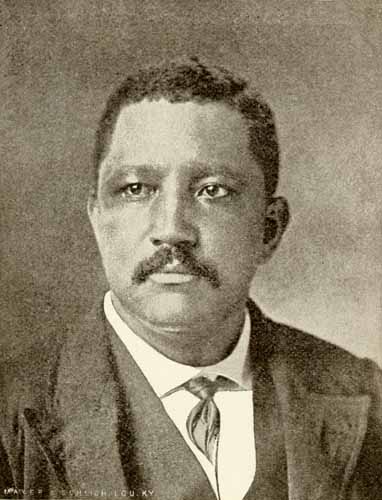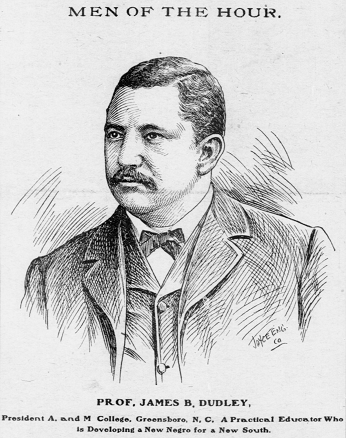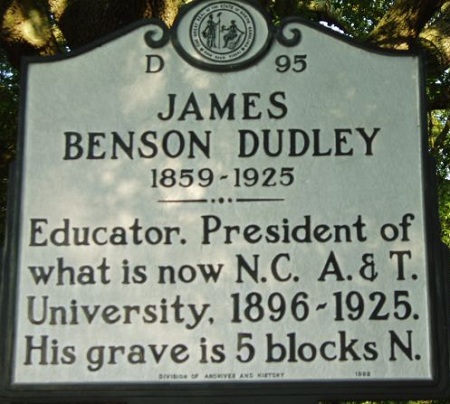Dudley, James Benson
by Kenneth Warlick, 1986; Revised by NC Government & Heritage Library, January 2023.
November 2, 1859 – April 4, 1925
See also: Susan Wright Sampson Dudely
 James Benson Dudley, educator and college president, was born in Wilmington to John Bishop and Annie Hatch Dudley, both enslaved by Edward B. Dudley (1789–1855), governor of North Carolina. Young Dudley's early education consisted of instruction in the carpentry trade given by his father and attendance at the Wilmington Normal School sponsored by the Freedman's Bureau. At that institution, he was instructed in Latin grammar by Ella Roper. He then attended the Institute for Colored Youth, the nation's first Black High School, in Philadelphia. He also attended Shaw University in Raleigh where he majored in elementary education. Later in his career, he was awarded a master of arts degree from Livingstone College in Salisbury and a doctorate of letters from Wilberforce University in Ohio.
James Benson Dudley, educator and college president, was born in Wilmington to John Bishop and Annie Hatch Dudley, both enslaved by Edward B. Dudley (1789–1855), governor of North Carolina. Young Dudley's early education consisted of instruction in the carpentry trade given by his father and attendance at the Wilmington Normal School sponsored by the Freedman's Bureau. At that institution, he was instructed in Latin grammar by Ella Roper. He then attended the Institute for Colored Youth, the nation's first Black High School, in Philadelphia. He also attended Shaw University in Raleigh where he majored in elementary education. Later in his career, he was awarded a master of arts degree from Livingstone College in Salisbury and a doctorate of letters from Wilberforce University in Ohio.
After working briefly as a mechanic's apprentice, in 1880 at the age of twenty-one he became a first-grade teacher in Sampson County. The following year he accepted a position as principal of the Peabody Graded Normal School in Wilmington, a post he held for fifteen years until 1896.
On February 23, 1882 Dudley married Susan Wright Sampson, a Wilmington teacher and, later, the author of the college song for the Agricultural and Mechanical College at Greensboro. They had two daughters; one died young and the other became the wife of Dr. S. B. Jones, British health officer at St. Kitts in the West Indies.
While in Wilmington, Dudley edited the Wilmington Chronicle, a Black weekly newspaper, and was active in politics, serving as register of deeds for New Hanover County in 1891 and as delegate to the 1896 Republican National Convention in St. Louis. He was secretary of the board of trustees for the Agricultural and Mechanical College at Greensboro from May 29, 1895 to May 27, 1896 before succeeding John O. Crosby as president of that institution on May 28,1896; he retained the post for twenty-nine years.
Because of his talent in winning both Black and white support, Dudley was able to raise the college at Greensboro from the point of bankruptcy to a position of prestige in the state. He was particularly successful in resolving conflicts between the faculty and administration, in making the school industries self-sustaining, and in convincing not only the white legislature to appropriate funds for education for Black Americans, but also a reluctant Black populace to support the previously unpopular agricultural and mechanical curriculum. During his administration the number of buildings on campus was increased from 2 to 13, the student body from 58 to 476, and the faculty from 8 to 46. He also played an important role in defining the character of the school. Believing that Black students could be most effectively taught by Black instructors, he began the gradual transition from a predominantly white to a predominantly Black faculty. Further, because he shared with Booker T. Washington an intense faith in agriculture and public service as the principal areas for the social acceptance and progress of Black Americans, he sought the development of a thorough agricultural program at the Greensboro school, stressing the agricultural over the mechanical or industrial aspects of the curriculum. This devotion to agricultural training led Dudley in 1901 to discontinue the female department at the college, on the assumption that young women were not well suited to agricultural pursuits and that their presence only hampered such programs at the school.
 His faith in the importance of agriculture in the life of Black Americans also led Dudley to establish farmers' institutes in conjunction with the Greensboro college. In 1912, with J. H. Bluford, an industrial arts instructor on the faculty, he cofounded the State Farmer's Union and Cooperative Society to encourage thrift, economy, and enterprise within the Black race. This organization was especially concerned with helping Black consumers deal with problems arising from the credit and mortgage system of the state, and in assisting Black farmers in buying and selling products at reasonable prices. Dudley also canvassed the state in 1917 to obtain matching funds for the Smith-Hughes appropriation so that a vocational agriculture department could be created to train agriculture teachers for the state's public rural schools.
His faith in the importance of agriculture in the life of Black Americans also led Dudley to establish farmers' institutes in conjunction with the Greensboro college. In 1912, with J. H. Bluford, an industrial arts instructor on the faculty, he cofounded the State Farmer's Union and Cooperative Society to encourage thrift, economy, and enterprise within the Black race. This organization was especially concerned with helping Black consumers deal with problems arising from the credit and mortgage system of the state, and in assisting Black farmers in buying and selling products at reasonable prices. Dudley also canvassed the state in 1917 to obtain matching funds for the Smith-Hughes appropriation so that a vocational agriculture department could be created to train agriculture teachers for the state's public rural schools.
Dudley was a member of the National Teachers Association (later the National Education Association) and one of the organizers of the North Carolina Negro Teachers Association, of which he was president for six years. He was chairman of the "Negro" section of the Greensboro Interracial Committee and the only member of that city's Committee of Extension. Although always concerned about the necessity of fundamental justice for Black Americans, Dudley counseled his race to be patient and nonresistant. During the 1898 Wilmington Coup, he rushed home from Greensboro, reportedly to calm Black residents of Wilmington and act as mediator between Black and white. On his arrival, he was met by the mayor of that city and received police protection for the duration of his visit.
Dudley also urged Black North Carolinians to remain loyal to the American cause during World War I and offered the Agricultural and Mechanical College campus to the federal government as a military training camp. A deeply religious man, he was a member of the Bethel African Methodist Episcopal Church, Greensboro, where he taught a Sunday school class and served as trustee. He was also a member of the Odd Fellows, the Pythians, and the Masons, serving for twenty years as foreign correspondent of the Grand Lodge of Masons.
In 1908 Governor Robert B. Glenn appointed Dudley as a delegate to the National Negro Fair Association in Mobile, Ala., and in 1920 Governor Cameron Morrison appointed him state commissioner for the National Memorial Association; in the latter capacity he was responsible for erecting a memorial in Washington, D.C., commemorating the Black American soldiers and sailors who had fought in the national wars.
Dudley died at his home in Greensboro at the age of sixty-six and was buried at Forest Cemetery, Wilmington.
A & M College, President's Reports (1902–10).
Department of Public Instruction, North Carolina Public Documents, vol. 2 (1903).
Warmoth T. Gibbs, History of the North Carolina Agricultural and Technical School (1966).
Carrye Hill K. Kelley, Profiles of Five Administrators (1964).
Nathan C. Newbold, Five North Carolina Negro Educators (1939).
Albert W. Spruill, Recollections from Aggieland (1964).
Additional Resources:
North Carolina Highway Historical Marker Program. 1991. James Benson Dudley. https://www.ncdcr.gov/about/history/division-historical-resources/nc-highway-historical-marker-program/Markers.aspx?sp=Markers&k=Markers&sv=D-95
Link, William A., ed. 1996. The rebuilding of old commonwealths : and other documents of social reform in the progressive era South. Boston: Bedford Books of St. Martin's Press.
Richings, G. F. 1902. Evidences of progress among colored people. Philadelphia: G. S. Ferguson.
1 January 1986 | Warlick, Kenneth
